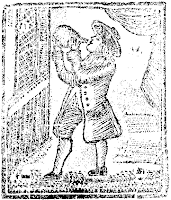Unabashed Gossip from William North
North was visiting their old commander-in-chief, George Washington, at Mount Vernon.
Only one sheet of what was at least a two-sheet document survives, so the text picks up in the middle. Based on the low-resolution scan on the society’s website, I think it reads:
She drank your health—but she has no breasts Ben! & then you know George Washington is to have her.North apparently referred to his host as “the Great Man” and to Martha Washington as “Madam.” In the first line above “George Washington” meant the general’s nephew George Augustine Washington, who married Martha’s niece Fanny Bassett the following year.
Here we are, three meals a day & quadrilles at night—The Great Man retires to his Study after breakfast, & us to our rooms. Could you believe it I have not hump’d a single Mollato since I am here, O tempora O Moses!
It now rains hard, & I pray God it may rain harder, the sooner the ice breaks, the sooner we set out. Miss Bassett & Madam Mew at each other like two cats, such a damned tune [?] I never heard. The Great man won’t stay long at home, he can’t bear this Solitude, this want of parade & flattery.
Poor Walker said Madam, he would only Stay 2 or three days with us & I declare I was sorry to part with him. The Women has a certain [?] goodness of heart, but then she is such a figure & squeaks so damnedly that there is no bearing her.
George Carter the son is married to Miss Skipwith, for to have fortune &c.
Lucy Randolph is at [???] I wish I was there too instead of here. The Byers [?] in [???].
The Baron makes a dive [?] at Congress on our return to annapolis, asks for nothing but his due, with months [?] of no plan or pension, retires to his farm & lives [blank] as usual.
With the favoring [?] of God I shall be with You soon.
Adieu May the Good Spirit comfort you
[Signature]
Mount Vernon
March 9th 1784
“George Carter” is often referred to as George Hill Carter of Corotoman (1761–1788) to distinguish him from relatives. He married Oratrix Lelia Skipwith (1767–1837), daughter of a baronet. Her next husband was St. George Tucker.
Lucy Randolph might be the daughter of Peyton Randolph who married French consul Joseph Latil in 1787 before dying three years later. No idea about the rest of that paragraph above.
“The Baron” meant Gen. Frederick William de Steuben, who was both North and Walker’s mentor and their charge. Always in debt, Steuben was lobbying the Congress for a bigger land grant and/or pension. North and Walker no doubt expected to clean up his financial affairs.
When North wrote this letter to Walker, they were both bachelors, possibly still living with the baron in New York. North’s remarks about Fanny Bassett’s breasts, the women enslaved at Mount Vernon, and who was marrying whom reflected their social position as both young army buddies and eligible gentlemen. Walker married in August 1784, North three years later.
This letter offers an unusual perspective on the Washingtons, to be sure. I suspect the master of Mount Vernon would have been absolutely furious to know about it. I’ve seen a couple of lines quoted, but I don’t think it’s ever been published in full, and I don’t claim all my transcription is accurate.


